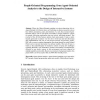Free Online Productivity Tools
i2Speak
i2Symbol
i2OCR
iTex2Img
iWeb2Print
iWeb2Shot
i2Type
iPdf2Split
iPdf2Merge
i2Bopomofo
i2Arabic
i2Style
i2Image
i2PDF
iLatex2Rtf
Sci2ools
136
click to vote
HCI
2009
2009
People-Oriented Programming: From Agent-Oriented Analysis to the Design of Interactive Systems
Where the Object-Oriented paradigm set about abstracting objects, iented (AO) theory draws on Psychology to abstract mentalist notions like: beliefs, perceptions, goals, and intentions. As such, the associated AgentOriented analysis can be used quite successfully to design interactive systems for people, delivering applications that are heavily individual-oriented. This reversal of the AO lens focuses analysis back upon people. It puts a multifaceted agent used in analysis `into the shoes' of the user and turns the design and implementation into one we call People-Oriented Programming (POP). POP calls on users to gather ethnographic data about themselves using Cultural Probes and on end-user innovation via software toolkits. This turn of focus is timely as the analyst/designer of interactive systems is facing new challenges regarding flexibility, user situatedness, dynamic environments, incomplete data, diversity in user needs, sensors in the environment, and users emersed in mult...
Analysis | Extensive Background Analysis | HCI 2009 | Human Computer Interaction | Interactive Systems |
Related Content
| Added | 18 Feb 2011 |
| Updated | 18 Feb 2011 |
| Type | Journal |
| Year | 2009 |
| Where | HCI |
| Authors | Steve Goschnick |
Comments (0)

